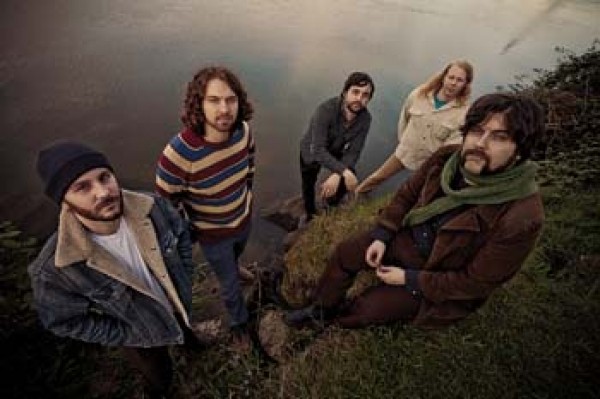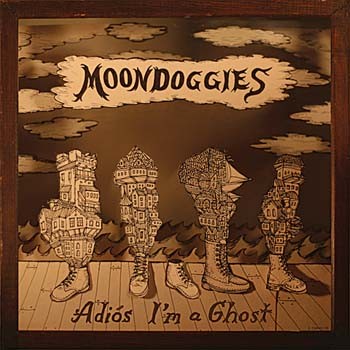
- The Moondoggies
The Moondoggies, Adiós I’m a Ghost
![]()

Building upon the intimacy and
masterful instrumentation accomplished in their previous two releases, Don’t Be a Stranger (2008) and Tidelands (2010), Seattle-based Americana-influenced quintet The Moondoggies now turn their gaze to the afterlife on their third album, Adiós I’m a Ghost. Frontman Kevin Murphy says that the 12-track record was inspired by the idea of “being able to have life after death.”
The result—with the addition of new band member Jon Pontrello—is transcendent and rich, featuring goosebumps-inducing group harmonies, woodsy and warm guitar, warbly Rhodes piano and a feel that’s both rustic and immaterial at the edges, reminiscent of an atmospheric Ha Ha Tonka. The album is bookended by two mostly instrumental tracks, “I’m a Ghost” and the titular “Adiós I’m a Ghost,” with fitting spectral-like vocals placed far, far in the background.
The band describes their sound as “folk with dirt on it” on their Facebook page, a fitting description for a track like “One More Chance.” Echoing some of the band members’ punk roots, it shakes and rattles apart, then magically coalesces back together, all to a head-bobbing drumbeat. “Pride” effectively explores darker emotional territory, and album highlight “Red Eye” showcases a rockin’ combination of intricate guitar lines and wailing organ. Aug. 13, Hardly Art
Zola Jesus, Versions
![]()

For Versions, her latest release, Russian-American indie electronica/pop artist Nika Roza Danilova, aka Zola Jesus, collaborated with composer J.G. Thirlwell (aka Foetus)—known for his work in the New York City new-wave scene in the ‘80s—to reinvent 10 of her previously released tracks as string arrangements. “Versions is about the bone of the music. … With all the framework exposed, the songs are given a new medium in which to evolve and bloom into their own tiny worlds,” she says.
While fans of Danilova may find the re-imagined tracks—mostly from past records, including Stridulum and Stridulum II (2010), Valusia (2010) and Conatus (2011)—intriguing, it’s too often that the two main components of Versions, the vocals and strings, don’t quite come together cohesively. And even though the tracks have been retooled to place Danilova’s vocals in the foreground—instead of melting smoothly into the instrumentals on the originals—the strings often compete with her beautifully dreamy voice.
On a slowed-down version of “Avalanche,” the constant, drawn-out vibrato doesn’t contain many lifts in which the listener’s ear can rest. Danilova’s vocals on “Hikikomori”—which originally featured perfectly subtle strings that would bubble up, then elegantly swim away—are overshadowed by the new heavy layer of violin. An effective balance on “Sea Talk” is found, however, with delicate pizzicato and sparkling strings that allow Danilova’s poetic lyrics to shine. Aug. 20, Sacred Bones Records
Twitter: @VonStonehocker